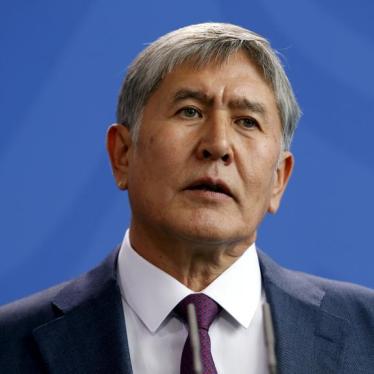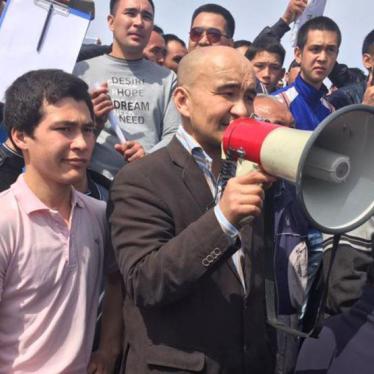(Berlin) – The Prosecutor General’s Office in Kyrgyzstan has brought an unjustified lawsuit against a human rights defender, a news outlet, and two journalists, on behalf of President Almazbek Atambaev, Human Rights Watch said today.
The prosecutor general should drop the lawsuit against Cholpon Djakupova, the rights defender, Zanoza news outlet, and the journalists Dina Maslova and Narynbek Idinov, and take immediate steps to lift travel bans imposed on the three individuals.
“Penalizing people who express or publish critical comments about the president violates free speech protections, and creates a broader chilling effect on expression in Kyrgyzstan,” saidMihra Rittmann, Central Asia researcher at Human Rights Watch. “The restrictions imposed on Djakupova, Maslova, and Idinov should be lifted immediately so that they are free to continue their important work without interference.”
During March and April, 2017, the prosecutor general brought five lawsuits targeting media outlets that have been critical of the government for allegedly discrediting the honor and dignity of the president and spreading false information. The Zanoza news agency, of which Maslova is editor-in-chief and Idinov its founder, was one. Radio Azattyk, the Kyrgyz branch of Radio Free Europe/Radio Liberty, like Zanoza, has also been accused of “biased coverage of unchecked, false information that deliberately affected the honor and dignity of the head of state.”
The most recent suit, on April 20, was against Djakupova, head of the Adilet Legal Clinic and former member of Kyrgyzstan's parliament, the Jogorku Kenesh. The suit alleged that during a March 30 roundtable on The Right to Peaceful Assembly and Freedom of Speech, organized by the human rights ombudsman’s office, Djakupova made “unjustified attacks on the president, alleging his ignorance and of breaking laws, while also accusing him of abuse of power for personal gain, and of putting pressure on free speech by selectively applying laws.”
A linguistic analysis conducted by the State Center for Forensic Expertise under the Justice Ministry concluded that “the stylistic construction of [Djakupova’s] speech contains emotional-expressive elements, irony, and sarcasm; the lexical-semantic and contextual analysis of [her] words and expressions showed that they contain negative information.”
The lawsuit claimed that Djakupova’s speech at the March 30 roundtable contained false information that defames the honor and dignity of the president, and that an article by Zanoza about the roundtable, quoting Djakupova, is also false and defamatory of the president. The suit requested damages from Zanoza, as well as Djakupova, Maslova, and Idinov of 3 million som each, a total of 12 million som (US$177,435).
The Prosecutor General’s Office on April 20 also asked the court to block access to the Zanoza article, to seize Djakupova’s property as collateral against a potential award for damages, and to impose a travel ban on the three until the conclusion of all proceedings.
On April 26, a court accepted the suit for consideration and granted its requests. Djakupova told Human Rights Watch that she was not informed of the lawsuit and only learned about it when local journalists began to call her for comment.
Djakupova appealed to the courts on April 28, and Maslova and Idinov on May 4, to lift the travel restrictions. No court date has been set to consider their complaints.
On May 10, Djakupova wrote an open letter to President Atambaev contesting the prosecutor’s claims and requesting his response to 10 questions related to the suit.
Separately, Klara Sooronkulova, a former member of the constitutional chamber, Rita Karasatova, a human rights lawyer, Idinov, and others, filed a joint complaint in mid-April with the Constitutional Chamber of Kyrgyzstan challenging the legality of the lawsuits on the president’s behalf.
Sooronkulova told Human Rights Watch that the law permitting the Prosecutor General’s Office to sue in defense of the president’s honor and dignity is incompatible with Kyrgyzstan’s constitution. About 150 other citizens signed on to the collective complaint, Sooronkulova said. Sooronkulova reported to the media on May 6 that the courts had accepted the complaint for consideration.
Laws that provide for offenses and penalties for those who criticize public figures, including figures such as the president, on the basis that it is considered insulting, are not compatible with freedom of expression standards under international law, and in particular with article 19 of the International Covenant on Civil and Political Rights (ICCPR), to which Kyrgyzstan is a party, Human Rights Watch said.
The UN Human Rights Committee, which interprets ICCPR, has stated that “The penalization of a media outlet, publishers or journalist solely for being critical of the government or the political social system espoused by the government can never be considered to be a necessary restriction of freedom of expression.” The committee has also made clear that “in circumstances of public debate concerning public figures in the political domain and public institutions, the value placed by the Covenant upon uninhibited expression is particularly high… [and] the mere fact that forms of expression are considered to be insulting to a public figure is not sufficient to justify the imposition of penalties.”
“The Prosecutor’s Office should end its repeat attempts to muzzle voices critical of Kyrgyzstan’s top leader,” Rittmann said. “Kyrgyz authorities should guarantee the right to freedom of expression, which means protecting – not prosecuting – journalists and rights defenders for expressing or publishing critical views.”
|
News Release
Kyrgyzstan: President Targets Critics
Drop Lawsuits Against Rights Defender, Media Workers
Your tax deductible gift can help stop human rights violations and save lives around the world.
Region / Country
Topic
Most Viewed
-
June 3, 2025
“They’re Ruining People’s Lives”

-
November 25, 2019
A Dirty Investment

-
January 25, 2024
“We’re Dying Here”

-
April 27, 2021
A Threshold Crossed

-
November 19, 2012
Losing Humanity





